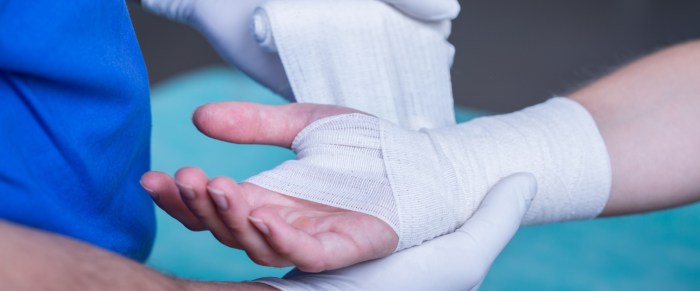Gruff prescription for a minor injury – Gruff prescriptions for minor injuries are a common occurrence in medical settings, often leaving patients perplexed and unsure. This guide delves into the concept of gruff prescriptions, exploring the reasons behind a doctor’s curt demeanor, the types of minor injuries that may warrant such prescriptions, and the importance of effective communication between doctors and patients.
By understanding the rationale behind gruff prescriptions and the significance of accurate injury assessment, patients can navigate these encounters with confidence, ensuring appropriate treatment and recovery.
Gruff Prescription Overview
A “gruff prescription” refers to a medical prescription provided by a doctor with a curt or abrupt demeanor. This demeanor may be due to various reasons, such as time constraints, frustration with patients’ non-compliance, or personal communication style.
Despite the doctor’s gruffness, it is important to understand that the prescription is intended to provide effective treatment for minor injuries.
Minor Injury Assessment

Common types of minor injuries that may warrant a gruff prescription include sprains, strains, bruises, and cuts. It is crucial to accurately assess the severity of these injuries to determine the appropriate treatment plan.
Significance of Accurate Assessment
- Ensures that the injury is not more serious than initially thought.
- Prevents unnecessary or excessive treatment.
- Facilitates proper healing and recovery.
Medication Considerations

- Ibuprofen:Non-steroidal anti-inflammatory drug (NSAID) for pain and inflammation.
- Acetaminophen:Non-narcotic pain reliever.
- Antibiotics:Prescribed for infections, such as those resulting from cuts or wounds.
Rationale for Specific Medications, Gruff prescription for a minor injury
- Sprains and strains:NSAIDs to reduce pain and inflammation.
- Bruises:Acetaminophen for pain relief.
- Cuts and wounds:Antibiotics to prevent or treat infections.
Treatment Instructions: Gruff Prescription For A Minor Injury

It is essential to follow the doctor’s instructions carefully when using a gruff prescription.
Importance of Adherence
- Ensures proper healing and recovery.
- Prevents complications or worsening of the injury.
- Avoids unnecessary side effects or interactions with other medications.
Consequences of Non-Adherence
- Delayed healing or recovery.
- Increased pain or discomfort.
- Potential complications or infections.
Patient Communication
Effective communication between the doctor and the patient is crucial for understanding the gruff prescription.
Tips for Patients
- Ask questions:Do not hesitate to ask for clarification or explanation if anything is unclear.
- Listen attentively:Pay attention to the doctor’s instructions and any warnings or precautions.
- Take notes:Jot down important information or ask for a written copy of the prescription.
- Follow up:If any concerns arise, do not hesitate to contact the doctor for further guidance.
FAQ Overview
What is a gruff prescription?
A gruff prescription is a medical prescription given by a doctor in a curt or dismissive manner, often for minor injuries.
Why might a doctor give a gruff prescription?
Doctors may give gruff prescriptions due to time constraints, frustration with patients who exaggerate their injuries, or a desire to convey the seriousness of the injury.
What types of minor injuries may warrant a gruff prescription?
Gruff prescriptions are typically given for minor injuries such as sprains, strains, bruises, and cuts.
What are some medications that may be prescribed for minor injuries?
Medications prescribed for minor injuries may include pain relievers, anti-inflammatories, and antibiotics.